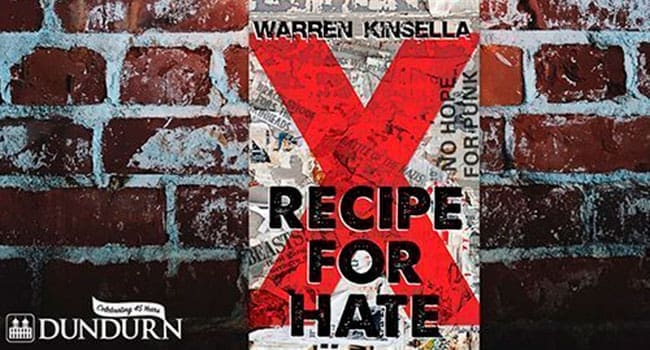 Life sometimes imitates fiction – and not in ways you’d expect.
Life sometimes imitates fiction – and not in ways you’d expect.
For example, I’ve just published a book called Recipe For Hate. It’s a novel.
Without giving away the plot, I can reveal that Recipe For Hate is about fanatics insinuating themselves into positions of power and influence. It’s about zealots, on the right and the left, clashing in the streets. And it’s about some people – people who should know better – believing that extremism can be a virtue.
Sound familiar?
As I was writing the book, I would love to say that I foresaw Brexit, the election of Donald Trump, and the rise of extremism on the left and the right – extremism that resulted in violence and murder in places like Charlottesville, Va. I’d like to brag that I saw all that coming.
But I didn’t.
Recently, when I was promoting Recipe For Hate, many journalists and editors told me that my book was indeed a case of life imitating art. But why, they asked, was it happening? What has changed in our collective consciousness to give rise to these nasty, brutish and short-sighted times?
There are three reasons, I think, for the political and social upheaval we’re seeing across the Americas and Western Europe. Three reasons why our traditional assumptions about politics have been completely upended.
One, the leaders of the racist right have become a lot smarter. Starting with Knights of the Ku Klux Klan leader David Duke in the 1970s, far-right haters have dispensed with the Klansmen’s robes and the cross burnings. They’ve radically changed their public image. Now, they march in polo shirts and carry tiki torches – and they offer slogans that are pro-white and not anti-minorities.
These racist leaders have studied the proven public relations techniques of mainstream political parties and corporations, and copied what they could. They’ve presented a kinder, gentler face to the media and the voting public, and it has paid off (see Trump, Brexit, above).
Two, their timing has been impeccable. In the 1970s, the extremists railed against fluoridation and the metric system. In the ’80s, it was abortion and gay rights. In the ’90s and beyond, however, the racist right have targeted immigrants and refugees. And it’s offered dividends in a big, big way.
It isn’t racist, of course, to oppose higher levels of immigration. It isn’t intolerant to want to debate how many refugees a country wishes to welcome.
But a variety of factors – Middle Eastern wars, Islamic extremism, severe climate change – have resulted in historically-high numbers of dispossessed people going on the march, looking for better and safer homes for their families. Many North Americans and western Europeans have grown uneasy about that.
Some have grown angry about it, too. And that, more than any other factor, has resulted in stunning political change – from Brexit in the U.K., to the National Front in France, to Trump in the U.S.
For the racist right, now is their time.
Three, the fanatics at the fringes know that solutions, these days, are pretty hard to come by. In 2017, the challenges we all face are complex and so are the solutions. So the alt-rightists and the white nationalists (who we used to call neo-Nazis and white supremacists, respectively and more accurately) offer simple and seductive solutions. They push emotional buttons instead of offering practical and moral ways forward.
That’s why the haters are on the march, everywhere.
I wish I had foreseen all of that when I wrote Recipe For Hate but I didn’t. Now that western society is being shaken to its foundations, however, all of us will be affected, in one way or another.
And that is not fiction.
Warren Kinsella is a Canadian journalist, political adviser and commentator.
Warren is a Troy Media Thought Leader. Why aren’t you?
The views, opinions and positions expressed by columnists and contributors are the author’s alone. They do not inherently or expressly reflect the views, opinions and/or positions of our publication.

